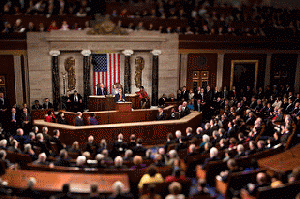Last night, President Obama made his last presentation to Congress on the State of the Nation. In that speech he outlined the successes of his administration but he also devoted considerable time to what he regards as his greatest failure -- that the political climate now is, if anything, worse than when he first entered office as president.
And of course he talked about solutions to the problem of our politics. He said that we need to somehow get campaign financing under control and he also noted that we need to somehow abolish gerrymandering. And we need to improve civility in the Washington establishment.
But unfortunately, Obama failed to get to the root of the problem and that is the polarization of this nation's politics. Gerrymandering and the problems of civility and of financing campaigns are symptoms of the deeper and more fundamental problem of having a polarized two-party system of politics. Understandably, the leader of one of this nation's two leading political parties would have great difficulty in recognizing that this is the fundamental problem, but it should not be hard for those of us who do not benefit from the polarization.
If we had multiple parties, all with a reasonable opportunity to win elections, then there would not be a single opposing team to focus venom on. With many different opponents the utility of negative advertising would diminish if not vanish -- and that would reduce the importance of money to buy outrageously expensive twenty-second advertisements on television. But there would be more of a need to explore the many different candidates and the details of their views on issues. These are all points made in the earliest articles in this series of articles.
To quote from Wikipedia, in political science, Duverger's law is a principle that asserts that plurality-rule elections structured within single-member districts tend to favor a two-party system. A brief and informative talk on Duverger's law will provide some further insight into this observation, first made in the 1950s by Maurice Duverger. It is not all that new an idea, but it is one that seems to be studiously ignored, not only in Washington (which is understandable) but by leaders like Ralph Nader who favor the ascent of additional political parties. Plurality voting is, of course, the system of voting we use almost universally in this country. Until we move away from plurality voting there is little chance that those additional political parties can ever take hold.
In the talk on Duverger's law that is referenced above, it is observed that two characteristic of plurality voting enforce the two-party system. The most important one would seem to be that plurality voting means that there is a very high hurdle that any candidate must jump in order to win election; getting more voters than any other candidate -- saying that you are their very first choice -- is something that takes a whole lot of recognition and support; it takes a very big political party. In this series of articles we have seen that using a balanced voting system is the key to solving this problem.
Somehow though, aside from this series of articles, little attention has been given to this first issue. But a number of different voting schemes like approval voting and instant runoff voting have been suggested as solutions to the second problem. That second problem is that, with plurality voting, individual voters, knowing about the high hurdle, tend not to vote for the candidate they most like but rather the candidate they like most among the few they judge have a chance of winning.
In this series of articles we have seen how several of the voting systems that resolve the second problem -- of the tendency toward strategic voting - can be adapted to be balanced systems that will also solve both of these two problems. Balanced voting systems will discourage polarization by offering voters a better opportunity to express their views. They might well be the best solution to the problems that Obama noted are plaguing our political system.
As noted in earlier articles, we can change the way we vote without any federal legislation. Our rules for voting are set by the individual states and in many instances those rules can be changed through voter initiatives. This is very fortunate -- we do not have to get approval from the very people in Washington who most benefit from two-party polarization in order to move away from it.






